Related Research Articles

The Who are an English rock band formed in London in 1964. Its core lineup consisted of lead vocalist Roger Daltrey, guitarist Pete Townshend, bassist John Entwistle and drummer Keith Moon. They are considered one of the most influential rock bands of the 20th century, and have sold over 100 million records worldwide. Their contributions to rock music include the development of the Marshall Stack, large public address systems, the use of synthesisers, Entwistle's and Moon's influential playing styles, Townshend's feedback and power chord guitar technique, and the development of the rock opera. They are cited as an influence by many hard rock, punk, power pop and mod bands. The Who were inducted into the Rock and Roll Hall of Fame in 1990.
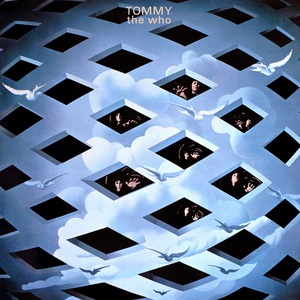
Tommy is the fourth studio album by the English rock band The Who, a double album first released on 17 May 1969. The album was mostly composed by guitarist Pete Townshend, and is a rock opera that tells the story of Tommy Walker. Tommy is traumatized from witnessing his father murder his mother's lover. Tommy's parents compound his trauma by denying the experience. In reaction, Tommy becomes dissociative. Tommy then experiences the trauma of being sexually abused. As a way of coping with his trauma, Tommy dissociates further through playing pinball. He gains a following because of his skill at playing pinball. After numerous misguided attempts to heal Tommy, a doctor prescribes him a mirror so he can confront himself and his experience. Instead, Tommy becomes self-absorbed and comes to think of himself as a messianic figure. When the mirror is eventually broken, Tommy comes out of his dissociative state. Tommy then tries to lead his followers to believe that the only path to healing is through him. His followers eventually reject him and his teachings.

Quadrophenia is the sixth studio album by the English rock band the Who, released as a double album on 26 October 1973 by Track Records. It is the group's third rock opera, the two previous being the "mini-opera" song "A Quick One, While He's Away" and the album Tommy. Set in London and Brighton in 1965, the story follows a young mod named Jimmy and his search for self-worth and importance. Quadrophenia is the only Who album entirely composed by Pete Townshend.

Who's Next is the fifth studio album by English rock band the Who. It developed from the aborted Lifehouse project, a multi-media rock opera conceived by the group's guitarist Pete Townshend as a follow-up to the band's 1969 album Tommy. The project was cancelled owing to its complexity and to conflicts with Kit Lambert, the band's manager, but the group salvaged some of the songs, without the connecting story elements, to release as their next album. Eight of the nine songs on Who's Next were from Lifehouse, the lone exception being the John Entwistle-penned "My Wife". Ultimately, the remaining Lifehouse tracks would all be released on other albums throughout the next decade.
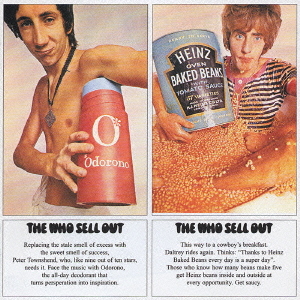
The Who Sell Out is the third studio album by the English rock band the Who. It was released on 15 December 1967 by Track Records in the UK and Decca Records in the US.

Live at Leeds is the first live album by English rock band the Who. It was recorded at the University of Leeds Refectory on 14 February 1970, and is their only live album that was released while the group were still actively recording and performing with their best-known line-up of Roger Daltrey, Pete Townshend, John Entwistle and Keith Moon.
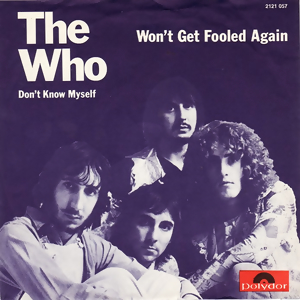
"Won't Get Fooled Again" is a song by the English rock band the Who, written by Pete Townshend. It was released as a single in June 1971, reaching the top 10 in the UK, while the full eight-and-a-half-minute version appears as the final track on the band's 1971 album Who's Next, released that August.
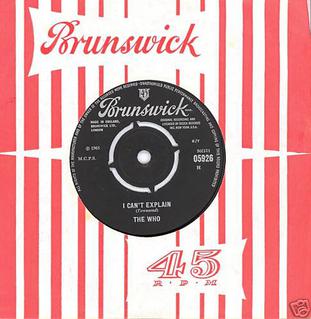
"I Can't Explain" is a song by English rock band the Who, written by Pete Townshend, and produced by Shel Talmy. The song was released as a single on 15 January 1965 in the United Kingdom, by Brunswick, and by Decca in America, in December 1964. It was the band's second single release and first under the Who name.

"Anyway, Anyhow, Anywhere" was the second single released by the English rock band the Who in 1965. It features call-and-response lyrics and some of the first ever recorded guitar feedback. The song was composed by lead singer Roger Daltrey and guitarist Pete Townshend, the only time they wrote together. The guitar feedback, although not the first to be heard on a record, is thought to be the first solo with feedback. This is the first Who release with Nicky Hopkins playing piano.

"I'm a Boy" is a 1966 rock song written by Pete Townshend for the Who. The song was originally intended to be a part of a rock opera called Quads, which was to be set in a future in which parents can choose the sex of their children. The idea was later scrapped, but this song survived and was later released as a single.
Skip Bifferty were an English psychedelic rock band formed in early 1966. The band featured future members of Ian Dury and The Blockheads.

Ride a Rock Horse is the second solo studio album by English singer Roger Daltrey, released on 4 July 1975 by Track in the UK and MCA in the US. Ride a Rock Horse was recorded during Daltrey's filming commitments for Ken Russell's film Lisztomania. The album's cover, which is photographed and designed by Daltrey's cousin Graham Hughes, depicts the singer as a rampant centaur.
"Armenia City in the Sky" is a song by the English rock band the Who, released on their 1967 album The Who Sell Out. It is the only song on the album not written by any members of the band, as it was instead written by Speedy Keen, a friend of the band.

"Dogs" is a UK single written by Pete Townshend and released by the Who in June 1968. It reached number 25 on the UK singles chart, lower than any single the band had released in several years. The B-side of the UK single was "Call Me Lightning". Both songs were originally released mixed in mono only, as they were not intended for album release.
"Tattoo" is a song written by Pete Townshend that was first released by The Who on their 1967 album The Who Sell Out. A "rite of passage" song, "Tattoo" tells the story of two teenaged brothers who decide to get tattoos in their attempts to become men. Themes of the song include peer pressure to conform and young men's insecurity about their manhood. The song has been heavily praised by critics and has appeared on several of The Who's live and compilation albums. It has also been covered by Tommy Keene and Petra Haden.
"Odorono" is a song written by Pete Townshend that was first released by English rock band The Who on their 1967 album The Who Sell Out. Townshend sings the lead vocal rather than normal Who lead singer Roger Daltrey. The song praises the virtues of an actual American deodorant named Odorono.
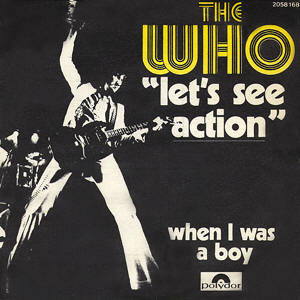
"Let's See Action" is a song written and composed by Pete Townshend and recorded by the Who. It was released as a single in the UK in 1971 and reached #16 in the charts.
The Scene Club was a 1960s music venue in Ham Yard, 41 Great Windmill Street, Soho, central London, England. The club opened in 1963 and was associated with the mod youth subculture.

The Tommy Tour was a concert tour by the English rock band the Who. It was in support of their fourth album, the rock opera Tommy (1969), and consisted of concerts split between North America and Europe. Following a press reception gig, the tour officially began on 9 May 1969 and ended on 20 December 1970. The set list featured the majority of the songs from Tommy, as well as originals and covers.
References
- ↑ Neill, Andrew; Kent, Matthew (2009). Anyway, Anyhow, Anywhere: The Complete Chronicle Of The Who, 1958-1978 (Rev. ed.). Sterling Publishing Company. p. 86. ISBN 978-0-7535-1217-3. OCLC 122283647.
- ↑ Atkins, John (2000). The Who On Record: A Critical History, 1963-1998. McFarland. p. 69. ISBN 0-7864-0609-7. OCLC 43060511.
- ↑ "Disguises - The Who | Song Info". AllMusic. Retrieved 2019-11-29.
- 1 2 Parker, Alan G.; Grantley, Steve; Body, Sean (2010). The Who by Numbers. Helter Skelter Publishing. p. 35. ISBN 978-1-905139-26-2.
- ↑ Kelts, Roland (2012-10-09). "Pete Townshend's War". The New Yorker. ISSN 0028-792X . Retrieved 2019-11-29.
- ↑ Perone, James E. (2008). Mods, Rockers, And The Music Of The British Invasion. Praeger Publishers. p. 113. ISBN 978-0-275-99861-5. OCLC 428195032.
- 1 2 Neill, Andrew; Kent, Matthew (2009). Anyway, Anyhow, Anywhere: The Complete Chronicle Of The Who, 1958-1978 (Rev. ed.). Sterling Publishing Company. p. 89. ISBN 978-0-7535-1217-3. OCLC 122283647.
- 1 2 "Ready Steady Who EP - The Who | Songs, Reviews, Credits". AllMusic. Retrieved 2019-11-29.
- ↑ Roberts, David (2006). British Hit Singles & Albums (19th ed.). London: Guinness World Records Limited. p. 277. ISBN 1-904994-10-5.
- ↑ "I'm a Boy - The Who | Song Info". AllMusic. Retrieved 2019-11-29.
- ↑ "The Hypertext Who › Disguises". www.thewho.net. Archived from the original on 2020-01-30. Retrieved 2019-11-29.
- ↑ "The Hypertext Who › Liner Notes › A Quick One". 2011-06-06. Archived from the original on 2011-06-06. Retrieved 2020-04-19.
- ↑ Neill, Andrew; Kent, Matthew (2009). Anyway, Anyhow, Anywhere: The Complete Chronicle Of The Who, 1958-1978 (Rev. ed.). Sterling Publishing Company. p. 87. ISBN 978-0-7535-1217-3. OCLC 122283647.
- ↑ Atkins, John (2000). The Who On Record: A Critical History, 1963-1998. McFarland. p. 69. ISBN 0-7864-0609-7. OCLC 43060511.
- ↑ Neill, Andrew; Kent, Matthew (2009). Anyway, Anyhow, Anywhere: The Complete Chronicle Of The Who, 1958-1978 (Rev. ed.). Sterling Publishing Company. p. 90. ISBN 978-0-7535-1217-3. OCLC 122283647.
- ↑ "The Who BBC Sessions". The Who. Retrieved 2020-04-19.
- ↑ Atkins, John (2000). The Who On Record: A Critical History, 1963-1998. McFarland. p. 74. ISBN 0-7864-0609-7. OCLC 43060511.
- ↑ Atkins, John (2000). The Who On Record: A Critical History, 1963-1998. McFarland. p. 126. ISBN 0-7864-0609-7. OCLC 43060511.
- ↑ Neill, Andrew; Kent, Matthew (2009). Anyway, Anyhow, Anywhere: The Complete Chronicle Of The Who, 1958-1978 (Rev. ed.). Sterling Publishing Company. p. 298. ISBN 978-0-7535-1217-3. OCLC 122283647.
- ↑ Atkins, John (2000). The Who On Record: A Critical History, 1963-1998. McFarland. p. 69. ISBN 0-7864-0609-7. OCLC 43060511.
- ↑ "Magic Bus - The Who | Songs, Reviews, Credits". AllMusic. Retrieved 2019-11-29.
- ↑ Wawzenek, Bryan (10 October 2018). "All 245 Who Songs Ranked Worst to Best". Ultimate Classic Rock. Retrieved 2019-11-29.
- ↑ Wawzenek, Bryan (26 May 2014). "Top 10 Underrated Who Songs". Ultimate Classic Rock. Retrieved 2019-11-29.